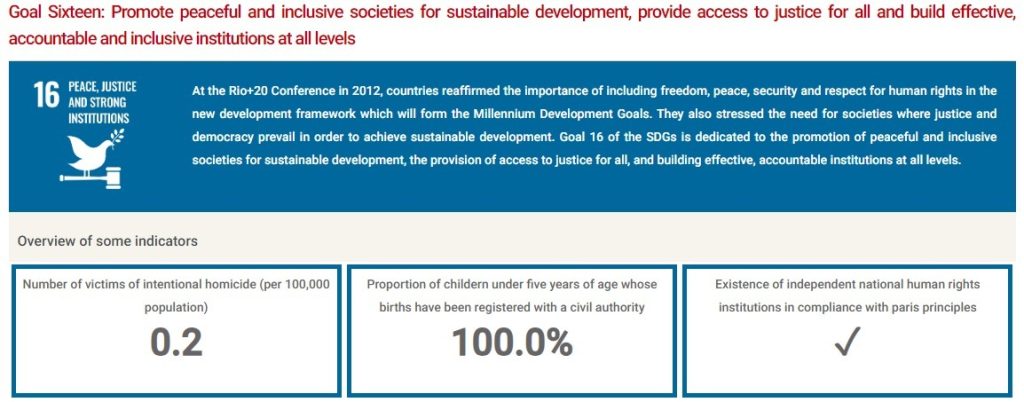SDG 16 - Peace, Justice and Strong Institutions
Gulf University is committed to supporting the Kingdom’s efforts toward achieving SDG 16: Peace, Justice, and Strong Institutions. The university actively fosters peaceful and inclusive societies through initiatives such as conflict resolution workshops and inclusive governance practices, including the election of faculty representatives and student representative in all committees. By promoting transparency, accountability, and ethical conduct within its operations, GU contributes to building strong institutions. These efforts demonstrate the university’s commitment to creating a just, equitable, and peaceful society.
GU support Bahrain’s SDG 16 committed to promote peaceful and inclusive societies for sustainable development, provide access to justice for all and build effective, accountable and inclusive institutions at all levels by practicing above mentioned initiatives.
The Government of Bahrain has made significant developments in promoting peace, justice, and strong institutions. The country’s democratic system, including the Council of Representatives, ensures a separation of powers and citizen participation. The judicial system has undergone modernization and implemented alternative penalties to promote rehabilitation. Bahrain has also taken steps to combat corruption through legislation, awareness campaigns, and international cooperation. These efforts demonstrate the Kingdom’s commitment to upholding the principles of SDG 16 and building a just and equitable society. Bahrain implemented several initiatives for SDG 16 which are as:
The Political System
Bahrain’s political system is built on a solid democratic base; its constitution enshrines many articles that align with the core principles of SDG 16 (Peace, Justice, and Strong Institutions). These include the democratic system of government (Article 1), which rests on a separation of the legislative, executive, and judicial authorities.
The Council of Representatives
The Council of Representatives, a key part of the Legislative Authority, plays a pivotal role in the legislative process. The elected Council contributes to ongoing constitutional and political reform in Bahrain, enforcing the separation of powers.
The Judicial System
The Kingdom continues to enhance the judicial system to ensure justice and efficiency. It has implemented alternative penalties for convicts, including the launch of the open prisons program in 2023 which serve as a rehabilitation approach that promotes the reintegration of prisoners into society. The sector underwent a full digital overhaul of civil and Sharia litigation services in 2020, and court administration has been transferred to an all-inclusive digital platform, providing streamlined processes across all litigation stages.
Anti-Corruption Efforts
The Kingdom has made significant strides in its efforts to combat corruption and promote transparency. Bahrain involves all members of society in the fight against corruption by holding regular national campaigns and via the national anti-corruption hotline, ‘Nazaha 992’, which was launched on International Anti-Corruption Day in 2009. The Kingdom has enacted laws such as the Anti- Corruption Law and the Money Laundering Law, which provide a strong legal foundation for combating corruption and money laundering activities. Additionally, Bahrain has signed international conventions, including the United Nations Convention against Corruption, demonstrating its commitment to international cooperation in the fight against corruption.
Bahrain efforts for SDG 16

Last Updated on November 27, 2024 @ 04:12:24 pm

